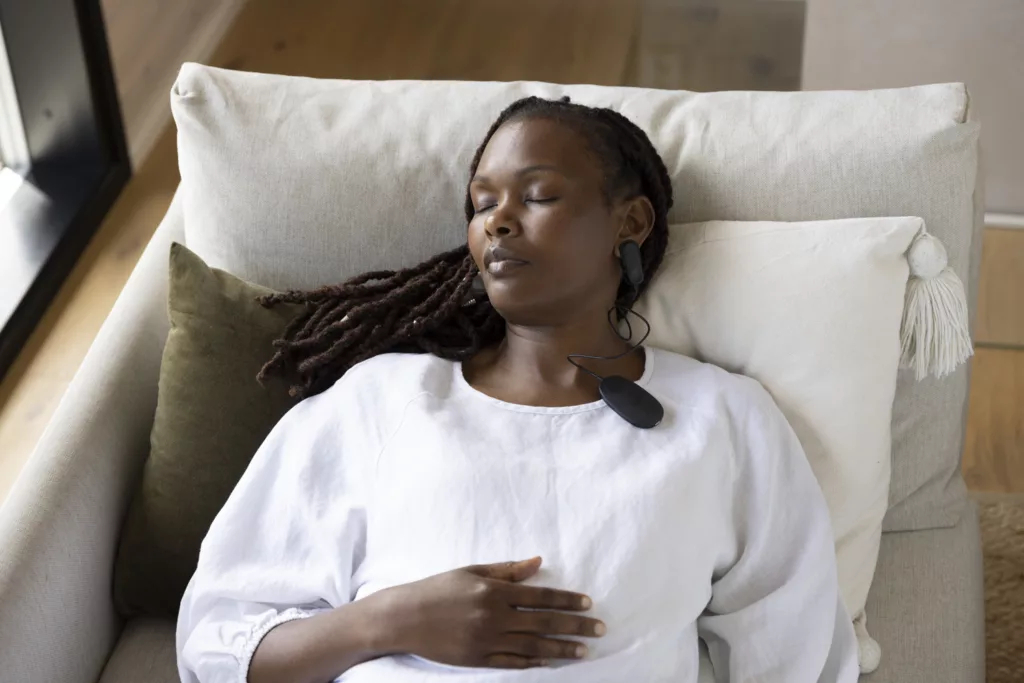Studies show digital mental health interventions can help adults reduce depression, even when they have severe symptoms. But most of the research is done on young people, who are more likely to turn to a digital solution for support. Can digital mental health interventions also help middle-aged or older adults reduce depression? According to a recent study led by Dr. Christine Gould from VA Palo Alto Health Care System and Stanford University, the answer is yes.
This is a critical finding — major depressive disorder, or MDD, is one of the leading causes of disability worldwide among older adults. In adults aged 55 years and older in the United States, 5.6% experienced MDD within a 1-year period.
It’s clear that older adults are in need of support. But the barriers they face to getting care are high, and many are unique to their age group — older adults are more likely to have limited transportation and mobility and to live further from treatment. And even when they’re able to access treatment, they’re less likely to be able to afford high healthcare costs.
So, how can we reach older adults with the accessible support they need?
Trends show that older adults, particularly boomers, are increasingly using smartphones. And we know that nonpharmacological interventions like cognitive behavioral therapy (CBT) and mindfulness-based interventions can help reduce depressive symptoms. Dr. Gould and her team set out to study whether these digital interventions would show clinically meaningful results for older adults.
And one more thing: Even though older adults are using smartphones, it turns out they’re less likely to actually use mental health-related mobile apps (even if they report openness to using them). The study also asked: If digital care is effective, what’s the best way to support this population in accessing it?
What was the intervention?
The study included 20 adults over the age of 40, with an average age of 61.7 years. All participants had elevated depressive symptoms, owned a smartphone, and resided in California (due to telehealth laws). The study did not include any adults with cognitive impairment, suicidal ideation, current participation in psychotherapy, problematic drinking, or psychotic symptoms. Participants taking psychotropic medications needed to be on a stable dose (>1 month) to be included.
The intervention was the Meru Health Program, an 8-week mobile app-delivered mental health program supported by remote therapists. Meru Health Program uses cognitive behavioral therapy (CBT) and mindfulness skills to treat depressive symptoms*.
The Meru app contains video instructional content and guided practices that teach CBT and mindfulness techniques. Patients also have access to a dedicated therapist via asynchronous messaging or, if needed, a phone (or video) call. There’s a moderated discussion board, where group members can share thoughts and experiences and receive feedback and encouragement.
How were outcomes measured?
Each participant completed the MDPQ, an assessment that measures mobile device proficiency, at baseline. This questionnaire is helpful in understanding whether the comfort level of older adults with a mobile app-based intervention could be a barrier for this age group.
Depressive symptoms were measured using the Patient Health Questionnaire (PHQ-9) and Patient-Reported Outcomes Measurement Information System (PROMIS) depression measures. The PHQ-9 was completed at the telephone screen, baseline, week 5, and week 8 (posttreatment). The PROMIS measures were completed at baseline and at weeks 5 and 8.
Anxiety symptoms were measured within the app using the Generalized Anxiety Disorder Scale (GAD-7), which was completed at baseline, week 5, and week 8 (posttreatment).
User experience and acceptability were examined through surveys and qualitative interviews.
What were the findings?
The study found that using the Meru Health Program led to significant decreases in depressive and anxiety symptom measures. 45% (9/20) of participants showed clinically significant improvement in either depressive symptoms or anxiety symptoms. 30% (6/20) participants had improvements in depressive symptoms and 45% (9/20) in anxiety symptoms. All 6 participants who experienced improvement in depression also showed improvement in anxiety.
While older age was associated with lower mobile device proficiency, neither age nor mobile device proficiency was significantly associated with change in scores on any outcome measures.
Most participants (79%, or 15/19) indicated that the program somewhat or completely met their expectations, and 89% (17/19) believed the app was helpful.
As expected, the practices were found to be the most helpful component. The therapist was a critical aspect of the program, particularly for participants who desired human contact, support, and encouragement or struggled with the practices or the app itself.
As highlighted by one participant:
“Having the therapist there for me was great in the fact that I felt like it wasn’t just a computer that I was interacting with in the program. She provided a personal touch which was very important in the program. Because I think we all, at least me, like to be validated by a human, it makes it [the program] more real to me…I had her in case the app was bothering me, I needed a connection to someone that I can talk to about, or if I didn’t understand something, I had her to be there for me.”
What does this mean for the future?
The future of depression support for older adults is brighter.
The findings of this study suggest that digital health interventions may benefit adults of all ages — including middle-aged and older adults.
The fact that 45% (9/20) of individuals experienced a clinically significant reduction in symptoms suggests that the program may be beneficial to some middle-aged and older users.
It’s also heartening to see that older adults had a low dropout rate (10%) and high engagement rate, which mirrors findings in younger adults.
Older adults reported high satisfaction with the app, good usability ratings, and an overall perception that the program was helpful.
One of the researchers, Meru Health’s Chief Research Officer, Dr. Valerie Hoffman shares, “This is the first study to report findings of a trial of participation in the Meru Health Program by middle-aged and older adults and one of the first of its kind for all digital mental health interventions. The findings suggest that these interventions can be used to benefit all adults, regardless of age and mobile device proficiency.”
Research findings help Meru Health continue to improve care.
Studies like this one help Meru Health iterate on the program and tailor the experience to the unique needs of each specific population.
In terms of the program’s effectiveness, it was encouraging for Dr. Hoffman to see that the findings suggested no need for specific program changes based on age or mobile device proficiency — it turns out that the same intervention that proved effective with younger users worked well for older adults, too.
Findings did suggest that middle-aged and older adult users would benefit from enhanced program orientation and increased control over video-delivered information (like the ability to rewind videos to review content).
THE Reasearch on effective online mental healthcare for older adults continues
According to Dr. Hoffman, “We are currently doing a study with 50 middle-aged and older adults to investigate these findings in a more robust sample, which will increase the confidence in the preliminary findings reported here.”
Although larger, controlled trials are needed to demonstrate efficacy, these findings align with research conducted on younger adults. The findings suggest that digital health interventions may benefit and should be offered to adults of all ages.
If future research validates these preliminary findings, mobile mental health interventions could be a valuable tool in addressing unmet treatment needs and reducing the burden of depression among older adults.
*Today the Meru Health program is 12 weeks long and includes also sleep & nutrition science as well as heart rate variability biofeedback practices.
Reference:
Gould, C. E., Carlson, C., Ma, F., Forman-Hoffman, V., Ranta, K., & Kuhn, E. (2021). Effects of mobile app–based intervention for depression in middle-aged and older adults: Mixed methods feasibility study. JMIR Formative Research, 5(6). https://doi.org/10.2196/25808





